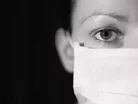[VIDEO] Nurses on the Front Line to End the Spread of Ebola

American nurses have seen better days. With a number of individuals under quarantine and two nurses diagnosed with the Ebola disease, nurses are all on edge ready to act if another Ebola case happens to arise.
The American Nurses Association’s Pamela Cipriano recently spoke with CNBC, addressing the current state of Ebola in the nation and how prepared nurses are to combat the disease.
“I think Ebola has created some challenges that now, we’ve really learned very quickly,” said Cipriano. “The American Nurses Association has been in touch with the CDC on a regular basis.”
“We’re really encouraging our nurses to work very closely with the organizations to make sure they have adequate training, that they have the supplies, and if there’s any concerns to raise them quickly and have those resolved,” she added.
Nurses on the front line are continuously learning the best methods to manage waste and its proper disposal, handle incoming patients with questionable signs and working to get the right equipment across the country to other facilities in need of them.
“What’s most important is to learn very rapidly, correct the problems, make sure we spread the information about what are the best practices and in this case it’s really rapid identification and screening tools and the right questions and vital signs to be taken when someone comes to the emergency department – you know have they traveled from West Africa? Have they been in contact with anyone known to have had Ebola or have had exposure? Do they have a fever? What other symptoms do they have? And then to move into a mode where if someone is identified, they’re quickly put into isolation and then we move them to a higher level of care,” said Cipriano.
“I think those are the kinds of things that we’re really focusing on,” Cipriano added. “Knowing that education is very important and then particularly the actual protection of workers with the ability to understand and then practice and have a buddy system to know they’re putting on protective equipment appropriately and taking it off.”



